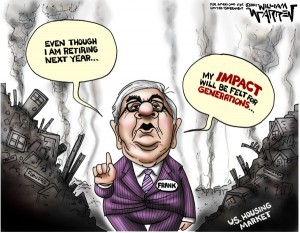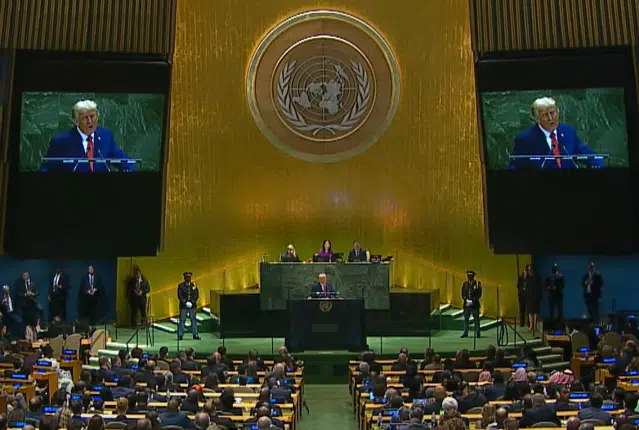 By Bill Wilson — It is not frequent that the retirement of a member of the House of Representatives would warrant any form of comment in these pages. But, then, Barney Frank was no ordinary Representative.
By Bill Wilson — It is not frequent that the retirement of a member of the House of Representatives would warrant any form of comment in these pages. But, then, Barney Frank was no ordinary Representative.
From 2007 until the end of 2010, Frank was the chairman of the House Financial Services Committee. Frank had been a staunch defender of Fannie Mae and Freddie Mac throughout his career and the buildup of the housing bubble. Under legislation Frank voted for in 1992, Fannie and Freddie only needed $900 of capital behind a $200,000 mortgage they guaranteed.
In 2003, he even accused Bush Administration critics of exaggerating the risks posed to the Government Sponsored Enterprises (GSEs) in the 2000’s. He thought the mortgage giants were “fundamentally sound financially”. In 2005, he denied there was any problem, saying, “you’re not going to see the collapse that you see when people talk about a bubble.”
As a result, when the financial crisis hit Frank was blindsided by the bankruptcy of Fannie Mae and Freddie Mac. As a supporter of the government’s so-called “affordable housing” programs, Frank led the House’s efforts to bail out Fannie and Freddie and other financial institutions in 2008 when those policies brought the nation’s economy to its knees.
Afterward, Frank had an historic opportunity to reform the financial system. But when the time came, Frank excluded Fannie and Freddie from his signature legislation along with Senator Chris Dodd, even though the GSEs were ground zero of the financial crisis.
Frank ignored the warning signs of the crisis, and then when it hit, did everything in his power to cover for Fannie and Freddie. Meaningful financial reform would have been to unwind government involvement in housing finance, instead of affirming it.
In the end, Frank did nothing with his moment as Chairman of the House Financial Services Committee to address the root, government causes that led to the housing bubble in the first place.
It failed to rein in the so-called “affordable housing goals” by the Department of Housing and Urban Development (HUD) on Fannie Mae and Freddie Mac, which rose from 30 percent in 1993 to 56 percent by 2008. It did nothing about HUD’s of “Fair Lending Best Practices” that required low-income lending, nor its Community Reinvestment Act (CRA) regulations favoring mergers of institutions that made the largest commitments to “flexible” lending standards.
Nor did Dodd-Frank do a thing about the weakened down-payments by the Federal Housing Administration, to say nothing of rolling back the easy money low interest rates policies of the Federal Reserve.
Instead, Dodd-Frank institutionalized “too big to fail” by establishing an unlimited bailout fund for the nation’s largest financial institutions administered by the FDIC. The whole purpose of the fund is to avoid unpopular votes in Congress when these institutions fail, as surely they will again, no thanks to Frank.
And although it slightly raised capital requirements for financial institutions, the legislation will likely prove woefully insufficient in dealing with the extent of overleveraging by financial institutions that still exists.
Frank leaves behind a disastrous record that will have consequences for years if not decades to come. His departure comes about twenty years too late. To his departure, American taxpayers say, good riddance.
Bill Wilson is the President of Americans for Limited Government. You can follow Bill on Twitter at @BillWilsonALG.






